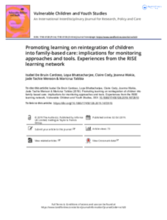ABSTRACT
Between 2015 and 2018, the RISE Learning Network facilitated learning on approaches, practices, methods, and tools that promote recovery and reintegration of children affected by sexual exploitation. Spanning three regions (Sub-Saharan Africa, South Central Asia, and Latin America and the Caribbean), the RISE Learning Network implemented two learning projects. The first project focused on monitoring (M&E Learning Project) and aimed to generate understanding of approaches and tools that could effectively monitor children and families’ reintegration outcomes. The specific purpose of RISE is to promote learning on reintegration of children affected by sexual exploitation; however, the remit of this Learning Project was to generate evidence on the reintegration of children who have been separated from their families for a range of reasons. This is to ensure that learning from different, but often related, areas of work can be included and compared to strengthen understanding of what successful reintegration of children could look like. The mid- and end-term reviews of the M&E Learning Project have captured lessons learned on how practitioners can approach monitoring of reintegration to mainstream it into their programme cycle. Key lessons learned include the importance of focusing on monitoring outcomes through participatory tools and the benefit of flexible, peer-to-peer learning approaches between practitioners using a variety of monitoring tools. This learning contributes to the nascent evidence base on what effective and efficient capturing of reintegration outcomes on children can look like, in addition to strengthening understanding of what successful reintegration for children and families means. The learnings can inform programming; monitoring, evaluation and learning frameworks; and other interventions around reintegration to ensure the holistic wellbeing of children and families.

